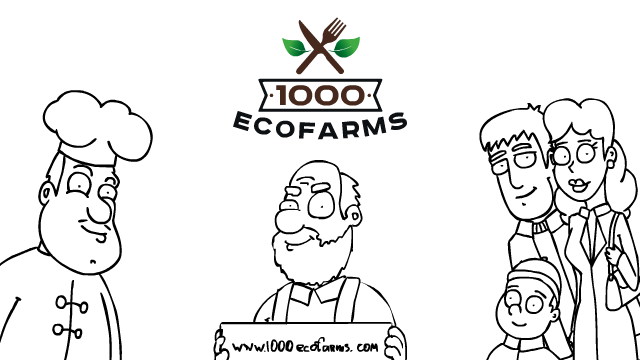Fighting food waste may not sound quite as trendy as eating organic and sourcing locally, but it’s just as important. If you worry about the damage conventional agriculture it doing to our soil, or lament the missed economic opportunities that sourcing from distant places causes, you need to be talking about food waste as well.
Why? Well, approximately 30-40% of the United States food supply will never be consumed. Meaning, all the resources that go towards producing that food—water, seeds, arable land, soil, fertilizers—are being used up without providing any nourishment in return. Considering the amount of people in the United States fighting hunger (48.1 million in 2014), as well as the devastating environmental impacts of industrial agriculture, such blatant waste of resources is reprehensible.
Food waste also contributes to global warming, as food that is not consumed typically ends up in a landfill, left to rot and release methane gas, the second most prevalent greenhouse gas emitted by human activities in the U.S. Such waste has contributed to landfills becoming the nation’s third largest source of methane gas. The food industry is one of the biggest contributors to man-made climate change, and large-scale meat and agriculture industries are only part of the problem — the food we waste amplifies this impact. According to National Geographic, “If food waste were a country, it would be the third largest producer of greenhouse gases in the world, after China and the U.S.”
Unfortunately, there isn’t one single cause of food waste to address, as food is wasted at all levels — production, distribution, and consumption. Luckily, the issue has received more publicity recently — it was featured on the cover of the March 2016 issue of National Geographic — and new businesses and organizations hoping to curb food waste are popping up everywhere. Even Walmart announced it would start carrying “ugly” fruits and vegetables.
Why? Well, approximately 30-40% of the United States food supply will never be consumed. Meaning, all the resources that go towards producing that food—water, seeds, arable land, soil, fertilizers—are being used up without providing any nourishment in return. Considering the amount of people in the United States fighting hunger (48.1 million in 2014), as well as the devastating environmental impacts of industrial agriculture, such blatant waste of resources is reprehensible.
Food waste also contributes to global warming, as food that is not consumed typically ends up in a landfill, left to rot and release methane gas, the second most prevalent greenhouse gas emitted by human activities in the U.S. Such waste has contributed to landfills becoming the nation’s third largest source of methane gas. The food industry is one of the biggest contributors to man-made climate change, and large-scale meat and agriculture industries are only part of the problem — the food we waste amplifies this impact. According to National Geographic, “If food waste were a country, it would be the third largest producer of greenhouse gases in the world, after China and the U.S.”
Unfortunately, there isn’t one single cause of food waste to address, as food is wasted at all levels — production, distribution, and consumption. Luckily, the issue has received more publicity recently — it was featured on the cover of the March 2016 issue of National Geographic — and new businesses and organizations hoping to curb food waste are popping up everywhere. Even Walmart announced it would start carrying “ugly” fruits and vegetables.
Fruitcycle is a social enterprise based in the Washington D.C. area that is giving new life to otherwise uneaten apples. Founder and food anthropologist Elizabeth Bennet visits orchards for gleaning, or collecting what is left in the fields after harvest, which she can get at a discounted rate as the imperfect apples are undesirable to wholesalers, retailers, and the public. She then dehydrates and spices them to create her apple chips—a healthy and environmentally responsible snack. The apples are sourced from a variety of local producers. You can purchase through their website, or if you’re in the D.C. area, you can find Fruitcycle products at Each Peach Market, Good Food Markets, Ah Love Oil & Vinegar and many other Washington-area stores.
Misfit Juicery is another D.C.-based company doing some good via the way of unwanted produce. According to their website, Misfit makes their cold-pressed juices with 70-80% of recovered produce—produce that was otherwise the wrong shape, color, or size to be sold to wholesalers and retailers. On the topic of using up food waste, Misfit also partners with the local company Compost Cab, which turns their leftover juice pulp into nutrient-rich compost that is transported to various urban agriculture organizations in the area. Find Misfit juices can be found at YES! Organic Market, Dolcezza, Eataly, and many other stores and cafes in D.C., Connecticut, New York, and New Jersey.
How can you fight against food waste? The most apparent way of course is to monitor your consumption habits — only buy what you are actually going to eat, and take the time to get creative or freeze the food you’re not going to use up before it goes bad. Make sure you interpret labels on packaged goods correctly, and know the difference between "sell by", "use by" and "best before" dates. And, you can stop being afraid of “ugly” produce! We promise, it’s just as tasty as its perfectly shaped counterpart. You can also support companies like Fruitcycle and Misfit Juicery — use your consumer power to tell the food industry what kinds of practices you’d like to see!
How can you fight against food waste? The most apparent way of course is to monitor your consumption habits — only buy what you are actually going to eat, and take the time to get creative or freeze the food you’re not going to use up before it goes bad. Make sure you interpret labels on packaged goods correctly, and know the difference between "sell by", "use by" and "best before" dates. And, you can stop being afraid of “ugly” produce! We promise, it’s just as tasty as its perfectly shaped counterpart. You can also support companies like Fruitcycle and Misfit Juicery — use your consumer power to tell the food industry what kinds of practices you’d like to see!








